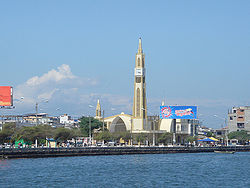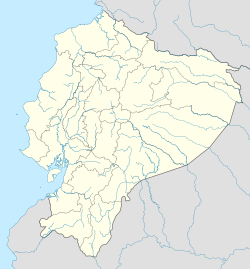Puerto Bolívar
Puerto Bolívar | |
|---|---|
 | |
| Coordinates: 3°16′S 79°59′W / 3.267°S 79.983°W | |
| Country | |
| Province | El Oro |
| Canton | Machala |
| Founded | December 18, 1883 (as Puerto Bolívar)[1][2] |
| Elevation | 6 m (20 ft) |
| Time zone | UTC-5 (PET) |
| Website | https://www.puertobolivar.gob.ec/ |
Puerto Bolívar is an urban parish and port city, part of the municipality of Machala, El Oro Province, Ecuador. Puerto Bolívar is one of the world's largest shipment points for bananas, most of them destined for Europe; about 80% of Ecuador's banana production is shipped through these port facilities.[3]
History
[edit]
A port established under Spanish rule under the name Puerto Pilo (later changing its name in 1783 to Puerto Machala) served as the precursor to Puerto Bolívar.[1][2] Initially a berth, it later established itself as a point of commerce between Machala and Guayaquil.[2]
After the cacao boom in Ecuador and the sedimentation of Puerto Pilo, Ecuadorian authorities sought to develop the Machala area, finally deciding in 1869 to establish a new port near Jambelí island called Puerto Huaylá.[4] In 1879 a dock was built in the new port.[2]
On December 18, 1883, the port was officially inaugurated as Puerto Bolívar in honor of Libertador Simón Bolívar, with new infrastructure, such as a railroad beginning to be built to connect the port to Machala on the same year. The port was elevated to a Major Port on April 13, 1897, and a main dock was built in 1902, which, along with the railroad, formed the first intermodal transport between El Oro and Guayas.[2]
Ecuadorian–Peruvian War
[edit]
After some skirmishes on early July 1941, a war between Ecuador and Peru saw a Peruvian offense being carried out on late July of the same year. The Peruvian army had established a paratrooper unit in 1939 and successfully used it to seize the port on July 27, marking the first time in the Americas that airborne troops were used in combat.[5][6][7]
After the war, the agricultural development of El Oro Province improved the local economy in the following years, and the port was further expanded for overseas exports from 1964 to 1968. A port authority was established in 1970, which started operations the following year.[2]
Ecuador and Peru signed a peace agreement in 1998, with resulted in the increase of commercial trade between the two countries. The cargo in transit through the docks of the port increased, especially from the north of Peru, for the North American and European markets. The Binational Group for the Promotion of Private Investment (GBPIP) was formed to encourage the creation of a complementary binational port axis of the ports of Paita in Peru and Puerto Bolívar in Ecuador to increase maritime and land trade between the two countries.
By 2008 the port was composed of three main docks, over 50,000 km2 of storage and around 53,000 km2 of parking, as well as a anti-narcotics building.[8]
Climate
[edit]| Climate data for Puerto Bolívar, elevation 6 m (20 ft), (1971–2000) | |||||||||||||
|---|---|---|---|---|---|---|---|---|---|---|---|---|---|
| Month | Jan | Feb | Mar | Apr | May | Jun | Jul | Aug | Sep | Oct | Nov | Dec | Year |
| Mean daily maximum °C (°F) | 29.4 (84.9) |
30.3 (86.5) |
30.0 (86.0) |
30.0 (86.0) |
28.6 (83.5) |
26.4 (79.5) |
25.5 (77.9) |
25.3 (77.5) |
26.0 (78.8) |
26.2 (79.2) |
27.4 (81.3) |
28.9 (84.0) |
27.8 (82.1) |
| Mean daily minimum °C (°F) | 23.5 (74.3) |
23.9 (75.0) |
24.0 (75.2) |
24.1 (75.4) |
23.6 (74.5) |
21.9 (71.4) |
21.2 (70.2) |
20.7 (69.3) |
21.1 (70.0) |
21.6 (70.9) |
22.3 (72.1) |
23.3 (73.9) |
22.6 (72.7) |
| Average precipitation mm (inches) | 44.0 (1.73) |
39.0 (1.54) |
59.0 (2.32) |
30.0 (1.18) |
8.0 (0.31) |
3.0 (0.12) |
0.0 (0.0) |
1.0 (0.04) |
1.0 (0.04) |
1.0 (0.04) |
1.0 (0.04) |
1.0 (0.04) |
188 (7.4) |
| Average relative humidity (%) | 81 | 81 | 81 | 81 | 82 | 85 | 86 | 86 | 86 | 85 | 84 | 82 | 83 |
| Source: FAO[9] | |||||||||||||
See also
[edit]References
[edit]- ^ a b "Puerto Bolívar celebra 136 años de fundación". Alcaldía de Machala. 2019-12-20.
- ^ a b c d e f "Reseña histórica". Autoridad Portuaria Puerto Bolívar.
- ^ Municipality of Machala website. Archived 2007-03-09 at the Wayback Machine
- ^ "The Cacao Boom in Ecuador". Soleq Travel Agency.
- ^ "Campaña Militar del 41". Escuela Superior de Guerra del Ejército.
- ^ Theotokis, Nikolaos (2020). Airborne Landing to Air Assault: A History of Military Parachuting. Pen and Sword Books. pp. 137–138. ISBN 9781526747020.
- ^ "Asalto aéreo a Puerto Bolívar". Caretas. No. 1375. 1995-08-01.
- ^ "Principales puertos y compañías navieras del Ecuador". El Nuevo Empresario. 2008-06-02. Archived from the original on 2009-02-28.
- ^ "CLIMWAT climatic database". Food and Agriculture Organization of United Nations. Retrieved 20 June 2024.

